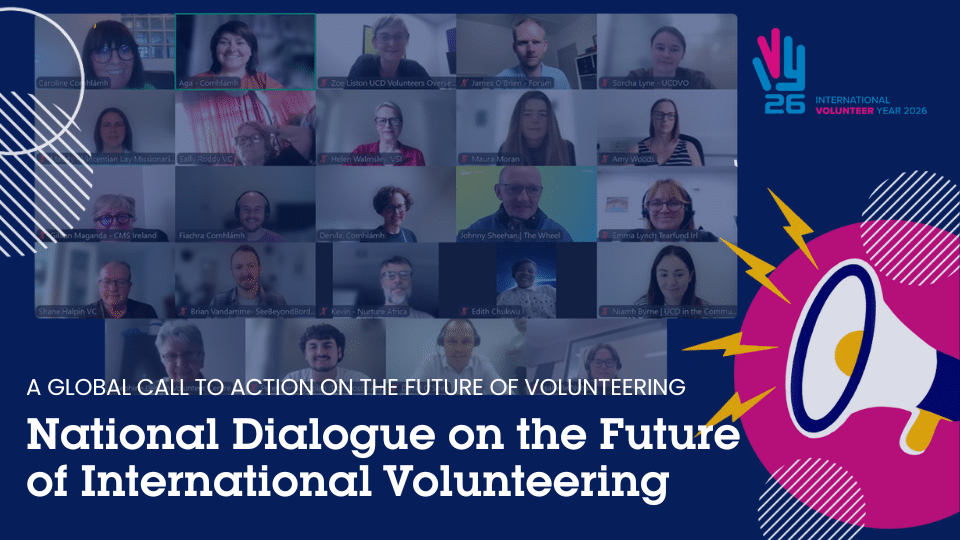What changes are required to support volunteering and increase its impact? Who is responsible for making these changes happen? In the run-up to International Year of Volunteering for Sustainable Development in 2026, these questions are being discussed by groups around the world. Here in Ireland, Comhlámh used the opportunity to host a discussion on the role and future of values-led international volunteering. In partnership with Volunteer Ireland, we brought together voices from international volunteering, third-level student engagement, civil society networks, and government representatives.
Through this dialogue, we identified key points to share with organisers, who include the International Forum for Volunteering in Development, the International Association for Volunteer Effort (IAVE)), the the International Federation of Red Cross and Red Crescent Societies (IFRC) and UNICEF. Along with feedback from national dialogues taking place in more than 100 countries, these will help to shape the key messages and priorities of a collective Call to Action.
Check out our collective feedback below.
Have Your Say - Take the Survey
You can still contribute to this important discussion by taking the survey below before July 9th.
Key Priorities emerging for International Volunteering and Civil Society Engagement
Overall, it was agreed that volunteering needs to be more strategically integrated into society, with improved public understanding about its impact. Terminology like “actions for solidarity” better reflects its purpose and avoids reinforcing power differentials.
The group noted that international volunteering is a powerful learning experience and a gateway to global citizenship. Global Citizenship Education-informed approaches are vital for exploring the root causes of injustice and inequality and fostering critical reflection.
The group also expressed concerns about the shrinking space for civil society in the context of global upheaval and deep precarity in the sector, particularly regarding funding and both public and political support.
The group’s main priorities included:
- Strengthen Values and Promote Solidarity
International volunteering is rooted in values including equity, mutual respect, and solidarity. Shifting from a charity mindset to a framing of “actions for solidarity” can challenge outdated perceptions and power imbalances.
- Decolonisation and Power Dynamics
There is an urgent need to consider ways of decolonising international volunteering – this includes the importance of recognising and addressing how privilege and power disparities can be present. Recognising mutual knowledge exchange. South-North partnerships and leadership from local partners are essential. - Inclusion and Accessibility
Volunteering must be open to and inclusive of all groups, ensuring equity of access for everyone, regardless of their personal circumstances. Organisations must be accountable to volunteers, not just donors. This includes adequate training and support, ongoing mentorship, and protection from racism and bias.
- Recognition and Funding
All modalities of volunteering need to be formally recognised by the State. Dedicated funding programmes are needed to support volunteers across all demographics and types of voluntary engagement. - Impact Measurement and Progression Pathways
Measuring the impact of volunteering—especially relational and hidden outcomes—is challenging but necessary. Volunteering often serves as a first step in careers in development and civic engagement.
Learn more about the global Call to Action on the Future of Volunteering.

